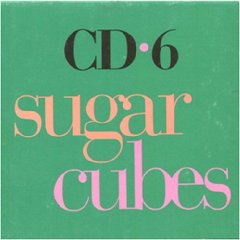Available in a nice green box are the first six Sugarcubes singles: be advised this ropes in the swift 1988 reissue of ‘Birthday’ and the less-than-triumphant ‘Christmas’ E.P. and leaves out the mighty ‘Hit’, but still – it’s a bucket of cute wiggling hissing snakes, and no mistake. Younger readers who think The Kooks are brilliant may require some back story about The Sugarcubes beyond the phrase “Bjork’s old band”.
In September 1987 One Little Indian released their single ‘Birthday’. The Sugarcubes were as close as Iceland then got to an Icelandic super-group, formed from members of K.U.K.L. (Icelandic for “witch”), who’d had a few outings on Crass Records, plus some poets and shouters. ‘Birthday’ was an extraordinary fluke, a bewildering, tortured, swelling and melancholy epic made impossible to ignore by the unknown Bjork’s committed and keening vocal flourishes. We heaped praise upon it. They instantly became cover stars, as the unforced surrealist humour of Bjork and much-castigated bandmate Einar Orn made for terrific quotes. Camera-crews, not used to Icelandic bands being anything other than mocked in “home of music” Britain, mobbed them in Reykjavik. If they had an aim it was to wrap subversive art statements in poppy accessibility. “We were very sweet and very dangerous“, said Bjork. “We couldn’t be more normal”.
Their lives would never be the same. “This wasn’t”, they sang, “supposed to happen…“ Everyone wanted a piece of them. Albums like Life’s Too Good and Here Today, Tomorrow, Next Week were okay, and did okay. They emphasised that, coming from a country where nature could kill you at any given moment, they approached every record and concert as if it were their last. These singles – ‘Cold Sweat’, ‘Deus’, ‘Regina’ – were sexy, drunken, a little (but not intimidatingly) strange.
By ‘92/’93, global touring was doing their heads in. The media’s attention deficit disorder had been held in check for a respectable period, but it was twitching onwards now. The poets couldn’t write because they were always stuck at soundchecks and suchlike. The Sugarcubes called it a night.
Then, a peculiar thing happened, proving that, in Icelandic life at least, there is such a thing as a Second Act. Bjork became a worldwide superstar and, bizarrely, a style and fashion icon. Her career since has tended to overshadow the band’s achievements, painting them as little more than a preamble to the “real” thing. One hopes this and other re-issues and re-packagings will redress the balance. The Sugarcubes came out of nowhere, ignored all recognised notions of “balance”, and briefly re-energised “indie” and “alternative” rock/pop with a spontaneous blaze of hyper-active twinkling, some Dali-meets-Dionysus escapism and a flicker of hope. Bjork may have been The Voice, but her troupe of Stuart Sutcliffes brought guts, wits and heart. The Sugarcubes melted opposition and stirred the blood.


